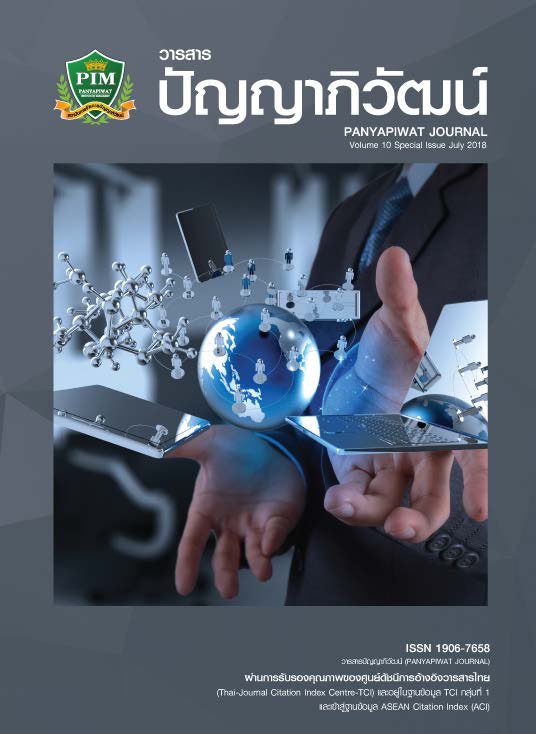การเพิ่มระดับความสำเร็จขององค์กรผ่านรูปแบบการจัดการของผู้นำในอุตสาหกรรมบ้านจัดสรร
Main Article Content
บทคัดย่อ
งานวิจัยนี้ศึกษาความสัมพันธ์ระหว่างรูปแบบการจัดการของผู้จัดการอุตสาหกรรมบ้านจัดสรร โดยมุ่งเน้นไปที่ปัจจัยภายนอกที่ไม่สามารถควบคุมได้ ซึ่งประกอบด้วยผลกระทบ 5 ด้าน ได้แก่ 1. การเมืองการปกครอง 2. เศรษฐกิจ 3. สังคมและวัฒนธรรม 4. เทคโนโลยี 5. ระหว่างประเทศหรือโลกาภิวัตน์ และระดับความสำเร็จขององค์กร กลุ่มตัวอย่างประกอบไปด้วยผู้จัดการขององค์กรจำนวน 251 คน ซึ่งให้ความร่วมมือในการตอบแบบสอบถาม เครื่องมือทางสถิติได้ถูกนำมาประยุกต์ใช้เพื่อการวิเคราะห์ข้อมูล ได้แก่ สถิติเชิงพรรณนา และการวิเคราะห์สถิติเชิงทดถอยพหุคูณ ผลการศึกษาพบว่า รูปแบบการจัดการของผู้นำหรือรูปแบบภาวะผู้นำแห่งการเปลี่ยนแปลงและผู้นำแลกเปลี่ยน มีความสัมพันธ์เชิงบวกกับผลประกอบการ สิ่งสำคัญที่ค้นพบในการศึกษาครั้งนี้คือ ความสัมพันธ์ระหว่างรูปแบบการจัดการของผู้นำและระดับความสำเร็จขององค์กรได้ถูกตัวแปรแทรก หรือปัจจัยภายนอกซึ่งส่งผลกระทบระหว่างความสัมพันธ์นี้ อีกทั้งข้อเสนอแนะและข้อจำกัดสำหรับงานวิจัยครั้งต่อไปได้ถูกกล่าวถึงในช่วงท้ายของบทความนี้
Article Details
“ข้าพเจ้าและผู้เขียนร่วม (ถ้ามี) ขอรับรองว่า บทความที่เสนอมานี้ยังไม่เคยได้รับการตีพิมพ์และไม่ได้อยู่ระหว่างกระบวนการพิจารณาลงตีพิมพ์ในวารสารหรือแหล่งเผยแพร่อื่นใด ข้าพเจ้าและผู้เขียนร่วมยอมรับหลักเกณฑ์การพิจารณาต้นฉบับ ทั้งยินยอมให้กองบรรณาธิการมีสิทธิ์พิจารณาและตรวจแก้ต้นฉบับได้ตามที่เห็นสมควร พร้อมนี้ขอมอบลิขสิทธิ์บทความที่ได้รับการตีพิมพ์ให้แก่สถาบันการจัดการปัญญาภิวัฒน์หากมีการฟ้องร้องเรื่องการละเมิดลิขสิทธิ์เกี่ยวกับภาพ กราฟ ข้อความส่วนใดส่วนหนึ่งและ/หรือข้อคิดเห็นที่ปรากฏในบทความข้าพเจ้าและผู้เขียนร่วมยินยอมรับผิดชอบแต่เพียงฝ่ายเดียว”
เอกสารอ้างอิง
Aksin, O. Z. & Masini, A. (2008). Effective Strategies for Internal Outsourcing and Offshoring of Business Services: An Empirical Investigation. Journal of Operations Management, 26(2), 239-256.
Aldridge, M. (2008). School Business Managers: Their Role in Distributed Leadership. Nottingham: NCSL.
Ames, P. C. (2003). Gender and Learning Style Interactions in Students’ Computer Attitudes. Journal of Educational Computing Research, 3(28), 231-244.
Antonakis, J. & House, R. J. (2013). A Re Analysis of the Full-Range Leadership Theory: The Way Forward. In B. J. Avolio & F. J. Yammarino. (Eds.). Transformational and Charismatic Leadership: The Road Ahead. Amsterdam. Netherlands: JAJ Press.
Avolio, B. J., Sosik, J. J., Kahai, S. S. & Baker, B. (2014). E-Leadership: Re-Examining Transformations in Leadership Source and Transmission. The Leadership Quarterly, 25(1), 105-131.
Bass, B. M. & Avolio, B. J. (2000). MLQ Multifactor Leadership Questionnaire. Redwood City: Mind Garden.
Bass, B. M. (1985). Leadership and Performance beyond Expectations. New York: Free Press.
Bass, B. M. (1990). From Transactional to Transformational Leadership: Learning to Share the Vision. Organizational dynamics, 18(3), 19-31.
Bass, B. M., Avolio, B. J., Jung, D. I. & Berson, Y. (2003). Prediction Unit Performance by Assessing Transformational and Transactional Leadership. Journal of Applied Psychology, 88(2), 207-218.
Chan, A. T. & Chan, E. H. (2005). Impact of Perceived Leadership Styles on Work Outcomes: Case of Building Professionals. Journal of Construction Engineering and Management, 131(4), 413-422.
Colbert, A. E., Kristof-Brown, A. L., Bradley, B. H. & Barrick, M. R. (2008). CEO Transformational Leadership: The Role of Goal Importance Congruence in Top Management Teams. Academy of Management Journal, 51(1), 81-96.
Das, S. B., Severino, J. M. R. & Shrestha, O. L. (2013). The ASEAN Economic Community: A Work in Progress. Singapore: Institute Of Southeast Asian Studies.
Department of Government Public Relations. (2017). Annual Report 2016. Bangkok: Department of Government Public Relations. [in Thai]
Frost, F. A. (2003). The Use of Strategic Tools by Small and Medium-Sized Enterprises: An Australasian Study. Strategic Change, 12(1), 49-62.
García-Gutiérrez, I. & Martínez-Borreguero, F. J. (2016). The Innovation Pivot Framework: Fostering Business Model Innovation in Startups. Research-Technology Management, 59(5), 48-56.
Hair, J. F. Jr., Black, W. C., Babin, B. J. & Anderson, R. E. (2010). Multivariate data analysis (7th ed.). Upper Saddle River, NJ: Prentice Hall.
Jenkins, R. (2005). Globalisation, Corporate Social Responsibility and Poverty. International Affairs, 81(3), 525-540.
Klungboonkrong, P., Jaensirisak, S. & Satiennam, T. (2017). Potential Performance of Urban Land Use and Transport Strategies in Reducing Greenhouse Gas Emissions: Khon Kaen Case Study, Thailand. International Journal of Sustainable Transportation, 11(1), 36-48.
Ministry of Finance. (2017). Annual Report 2016. Bangkok: Ministry of Finance. [in Thai]
Ministry of Social Development and Human Security. (2017). Annual Report 2016. Bangkok: Ministry of Social Development and Human Security. [in Thai]
Mirzakhani, M., Parsaamal, E. & Golzar, A. (2014). Strategy Formulation with SWOT Matrix: A Case Study of an Iranian Company. Global Business and Management Research, 6(2), 150.
Müller, R. & Turner, R. (2010). Leadership Competency Profiles of Successful Project Managers. International Journal of Project Management, 28(5), 437-448.
Mumford, D. M., Zaccaro, S. J., Connelly, M. S. & Marks, M. A. (2000). Leadership Skills: Conclusions and Future Directions. The Leadership Quarterly, 11(1), 155-170.
Northouse, L. P. (2001). Leadership Theory and Practice. CA: Sage Publications.
Pieterse, A. N., Van Knippenberg, D., Schippers, M. & Stam, D. (2010). Transformational and Transactional Leadership and Innovative Behavior: The Moderating Role of Psychological Empowerment. Journal of Organizational Behavior, 31(4), 609-623.
Ryan, R. (2008). Leadership Development: A Guide for HR and Training Professionals. London: Butterworth-Heinemann.
Sharma, P. (2004). An Overview of the Field of Family Business Studies: Current Status and Directions for the Future. Family Business Review, 17(1), 1741-6248.
Tshabalala, D. B. & Rankhumise, E. M. (2011). What Impact Do Economic Issues Have on the Sustainability of Small, Medium and Micro Entrepreneurs. Journal of Management Policy and Practice, 12(1), 108-114.
Zhang, W., Daim, T. & Zhang, Q. (2017). Understanding the Disruptive Business Model Innovation of E-Business Microcredit: A Comparative Case Study in China. Technology Analysis & Strategic Management, 1-13.
Zhu, W., Avolio, B. J. & Walumbwa, F. O. (2009). Moderating Role of Follower Characteristics with Transformational Leadership and Follower Work Engagement. Group and Organization Management, 34(5), 590-619.
Zumitzavan, V. & Michie, J. (2015). Personal Knowledge Management, Leadership Styles, and Organisational Performance: A Case Study of the Healthcare Industry in Thailand. Singapore: Springer.


